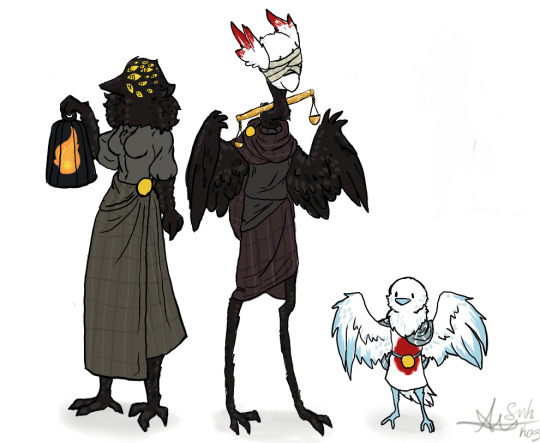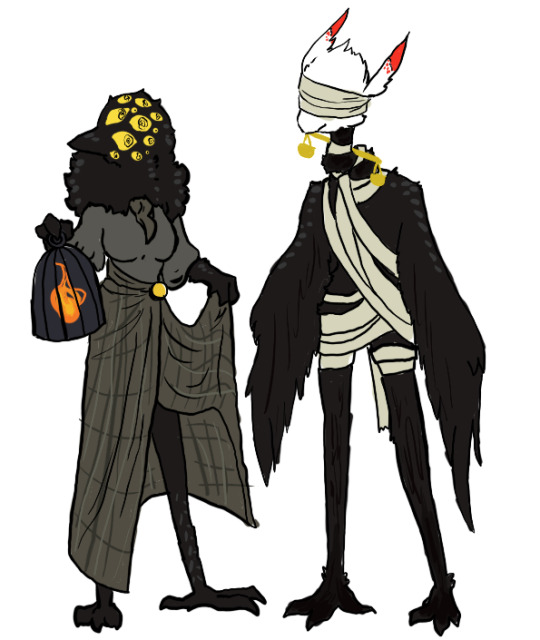#punishmen bird
Explore tagged Tumblr posts
Text


#art#lobotomy corporation#big bird#bird of judgement#punishmen bird#three birds#anomaly art#anomaly#lobotomy corporation art#birds in my style
45 notes
·
View notes
Text
Pippa and Kitsey: Theo’s Estella
As far as shipping goes in the Goldfinch novels, Boris and Theo are the relationship that has gotten the most attention among the passionate fans of the Goldfinch. However, many casual readers, if Goodreads-discussions are anything to go by, would like for Theo to end up with Pippa.
The book having been thought of as ‘dickensian’ by several critics and taking into account Theo’s obsession with Pippa, some readers have claimed that Pippa is the Estella to Theo’s Pip.
I think that’s not only false, but it’s also oversimplifying what Donna Tartt has done here.
Let’s start with Estella from Great Expectations. Estella is a young woman who was orphaned and adopted by the wealthy miss Havisham. To put it simplistically, she is raised to be a lady, but she’s also raised to be cold, cruel; a punishmen to all men and consequently the one to keep breaking Pip’s heart. Despite her feelings for Pip, Estella does what she was raised to do; she breaks men’s hearts, but she also ends up in an abusive marriage that thankfully ends and she eventually has the chance at a better life with Pip.
With Pippa’s name sounding like the female version of ‘Pip’ the readers who have perceived this as a nod to Great Expectations they have assumed that Theo’s intense feelings for her, which span from childhood to adulthood, the fact that Walty could be seen as Theo’s ‘benefactor’ in the way Estella’s father was Pip’s benefactor in Dickens’novel, her being sent to a wealthy but cold aunt who then sent her away, and the eventual revelation that she had to fight her feelings for Theo too make her Estella.
That said, there’s also Kitsey. Kitsey fits Estella’s character and cold attitude much better. In this case Mrs. Barbour can be seen as Miss Havisham: Cold and distanced in many ways, raising a daughter that would be as cold and who would eventually get into a questionable relationship with a man. Moreover, Kitsey is described as being emotionally distant and her father dies in the sea, as Estella’s father’s fate was cealed.
In either of these scenarios, Theo is Pip; with his dead guardian and with being raised for some time by an abusive family member; with his benefactor who sets him down the path he wants to follow; with his unlawful acts that do not aim at hurting or putting in turmoil other people’s lives; with his unrequited love.
But at the end of the day, who -between these two young women whose contrast is emphasized even with the way they dress and with th colouring that Donna Tartt picked for them- is Estella? Pippa, the little red bird with her soothing voice and all her warmth or the rational, cold and composed Kitsey with her rare showcases of genuine emotion and of her occational, sharp-as-a-blade honesty? In my opinion, the answer is... NEITHER.
Donna Tartt masterfully uses the readers’ expectations to make a point. Each woman represents a different way of living for Theo. Kitsey is the suppression of unwanted impulses in order to conform with the norm.
Is Kitsey right? If your deepest self is singing and coaxing you straight toward the bonfire, is it better to turn away? Stop your ears with wax? Ignore all the perverse glory your heart is screaming at you? Set yourself on the course that will lead you dutifully towards the norm, reasonable hours and regular medical check-ups, stable relationships and steady career advancement, the New York Times and brunch on Sunday, all with the promise of being somehow a better person?
On the other hand, for a long time Pippa was not a real person for Theo.
And as much as I’d like to believe there’s a truth beyond illusion, I’ve come to believe that there’s no truth beyond illusion. Because, between ‘reality’ on the one hand, and the point where the mind strikes reality, there’s a middle zone, a rainbow edge where beauty comes into being, where two very different surfaces mingle and blur to provide what life does not: and this is the space where all art exists, and all magic. And—I would argue as well—all love. Or, perhaps more accurately, this middle zone illustrates the fundamental discrepancy of love. Viewed close: a freckled hand against a black coat, an origami frog tipped over on its side. Step away, and the illusion snaps in again: life-more-than-life, never dying. Pippa herself is the play between those things, both love and not-love, there and not-there.
And from this passage we can derrive that Theo’s love and even his view of Pippa is in many ways an illusion. They are identified. In fact, this affects the way I experience Pippa’s character while reading. Kitsey, whom Theo cares for but who isn’t loved by him in this idealized way feels like an individual; like a character that is more fleshed out. On the other hand, Pippa feels like an individual in 2 occasions throughout the book: during their discussion when her and Theo have dinner after going to the movies and when, through her letter, she tells him why she did not keep the necklace.
Theo is in love with the girl that held walty’s hand and with the girl that lost her father-figure; ith the girl that tasted of morphin lollypop and who was emotionally traumatized because of the explosion like he was. At the same time he has stripped her of her flaws in his head. Theo, the Pip of our story to whom every great expectation that men have of life remains unfulfilled, is in love with a female version of himself: of Pip(pa).
[...]it was much too much, she was sorry, and—maybe she was speaking out of turn, and if so she hoped I forgave her, but I shouldn’t think she didn’t love me back, because she did, she did. (You do? I thought, bewildered.) Only it was complicated, she wasn’t thinking only of herself but me too, since we’d both been through so many of the same things, she and I, and we were an awful lot alike—too much. And because we’d both been hurt so badly, so early on, in violent and irremediable ways that most people didn’t, and couldn’t, understand, wasn’t it a bit… precarious? A matter of self-preservation? Two rickety and deathdriven persons who would need to lean on each other quite so much? not to say she wasn’t doing well at the moment, because she was, but all that could change in a flash with either of us, couldn’t it? the reversal, the sharp downward slide, and wasn’t that the danger? since our flaws and weaknesses were so much the same, and one of us could bring the other down way too quick?
In fact, in some ways, Pippa is a stronger version of Kitsey. She follows the same way of living BUT she is strong enough to resist temptation alltogether, unlike Theo.
But what does resisting temptation come down to? Kitsey KNOWS that Tom Cable is problematic. Pippa KNOWS that being with Theo may bring her down.
But what about Theo? Theo is content with Kitsey. He is in love with the idea of running towards an idealized version of Pippa that moves further away the more he approaches, and who ultimately remains out of reach. But, as an adult what is he running FROM? What may be his own undoing; he forbidden fruit he has to resist to move towards the norm?
What he’s afraid of is “like Boris—[...] to throw [him]self head first and laughing into the holy rage calling [his]name”, but that’s a theme that I’ll need to expand upon in another post.
54 notes
·
View notes